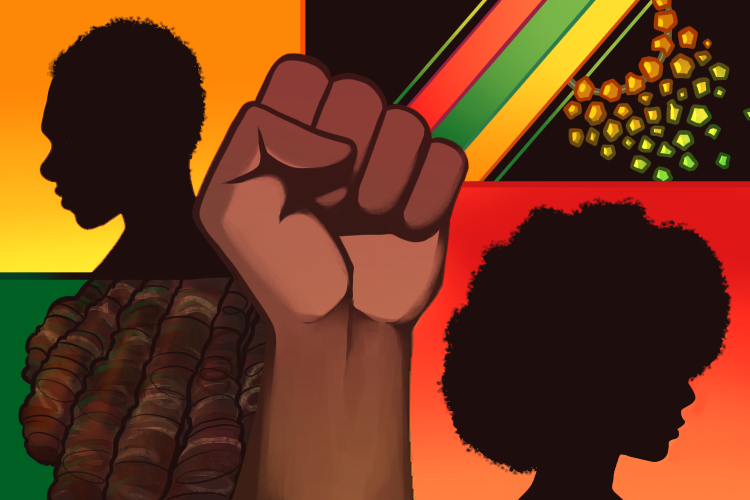Photo Credit: Illustration by Olivia Lake
Black History Month: Unknown Black Figures in History
From Harriet Tubman to Rev. Dr. Martin Luther King, Jr, African American heroes have been seen all throughout history. All of these names are familiar to the African American community as they created new avenues for African American Civil Rights. However, there are those in history whose names have not been recognized in our education and our culture.
Albert Murray
He was an essayist and social critic whose gifts enlightened people’s ideology on race and challenged Black segregation. Murray believed that American society was “incontestably mulatto” due to his belief that Black and White were inextricably bound to one another. One of his bestsellers was “The Omni-Americans,” which held a collection of his essays and a rebuking critique of Black separatism. His book revolutionized the idea that America was a nation of multicultural people who shared a common destiny.
Howard Thurman
He was a pastor and professor who wrote a groundbreaking book called, “Jesus and the Disinherited.” In his book, he criticized the form of Christianity that is far too associated with “the strong and powerful against the weak and oppressed.” Through his writing, the portrait of Jesus was revolutionized and enlightened Dr. King. Thurman was the first African American pastor to go to India and meet Mohandas Gandhi. He inspired King to merge Gandhi’s ideas of nonviolence with the Civil Rights Movement. Through his work he inspired his congregation and great leaders. His steps significantly paved the way for revolutionary ideas to overcome segregation.
Ella Baker
Baker was an activist who was part of the NAACP and the Southern Christian Leadership Conference where she was a co-founder and also the organization led by Dr. King. She was also a founder of the Student Nonviolent Coordinating Committee (SNCC). She was known as “the mother of the civil rights movement.” Well known for her mentorship to the movement’s most significant leaders and her ideology that the movement could not depend exclusively on charming leaders, she empowered African Americans to be activists in their own communities. Her enlightening standpoint inspired the SNCC when they embarked on their Freedom Summer voter registration drive in Mississippi 1964. Significant civil rights leaders look to her as true accreditation and are empowered by her change.
Daisy Gatson Bates
She was president of the Arkansas NAACP and was responsible for the strategy of desegregating the state and conducting the nine Black students who integrated Central High School in 1957 in Little Rock, Ark. She chose the nine students, transporting them to the school and guarding them from mobs and protestors. When she and her husband moved to Little Rock they founded, “The Arkansas Press,” which discussed the Civil Rights Movement. She later moved to Washington D.C., where she began working with democratic National Committee as well as anti-poverty projects under President Lyndon B. Johnson. Her legacy will always be a milestone in the African American community.
Paul Robeson
He was an athlete, actor, author, lawyer, singer and activist. However, he was best known for his music. He graduated from Rutgers University where he was class valedictorian. He earned his law degree in Columbia and worked for a law firm in New York City until he later protested against their racism. In the 1920s, he began his interest in theater, where he had starring roles in Eugene O’Neill’s, “All God’s Chillun Got Wings” and “The Emperor Jones.” His hit song became “Ol Man River,” which gained popularity on stage and behind the screen. His best role was in Shakespeare’s, “Othello,” which became the longest-running Shakespearean play in Broadway history. He soon became a controversial figure as his views for human rights angered the society of the 1950s. He soon lost credibility and his music and work vanished from the radio and television screen. Even though he lost much, his sacrifice helped pave the way as an example to generations.
Eunice Hunton Carter
She was a social worker and prosecutor whose investigative work in the 1930s led to the largest crime case in New York City. When mob leader Charles “Lucky” Luciano fell, the credit went to Thomas Dewey, who later ran for president. However, it was Carter who was an assistant district attorney who laid the foundation of the case. She became the first black woman to graduate from Fordham Law School in 1932–at a time of extremely few Black or women lawyers. She soon became the first African American assistant district attorney. She was the only Black woman to help Dewey in the case, which had been created to fight organized crime. She was used to fight crimes against women, such as human trafficking. She discovered that brothels in New York were controlled by Luciano’s mob, which received a share of their money in trade for legal representation. Her investigation led to Luciano’s case and conviction in 1936. She later went into private practice and other achievements, including a committee chair for the United Nations. Her outstanding work in the justice system is what helped inspire the work of those who would come after her.
All of these heroes have been long lost in history. This is to honor and bring recognition to those who have made an impact, but never seen. Those who spoke, but were never heard. And those who led, but never recognized. Let us honor those long lost heroes.

